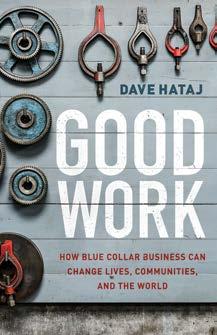
2 minute read
Being your own boss
Author explores what motivates the self-employed
The Soul of an Entrepreneur. Work and life beyond the startup myth
By David Sax (PublicAffairs, 2020. 289pp., $28US)
David Sax’s background gives him considerable life experience to frame his examination of what makes entrepreneurs tick, and why they get up in the morning.
A freelance writer and author, his partner is also self-employed. His grandparents owned their own business, and his father runs a law firm.
The term entrepreneur, he explains, was first described in 1730, based on a 13 th century French verb that means to do something.
The “something” that the media and popular imagination often cite is the Silicon Valley dream of launching a firm, raising lots of money, and cashing out.
But that notion, which he examines and demystifies, overlooks most people around the world who take risks to provide useful goods and services. For Sax, true entrepreneurs are people who “fixed holes in my roof, baked my bread, designed my website, changed my tires and cut my hair.”
Despite the attention given to entrepreneurship by countless business schools, magazines, books, and TV shows such as Dragon’s Den and Shark Tank, fewer people are going into business for themselves than was the case decades ago, he suggests.
Only one out of 10 Americans are starting their own business now, half as many as when Ronald Reagan was US president in the 1980s.
Entrepreneurship is a constant process of soul searching, he says. His quest to understand entrepreneurs takes him to visit remarkable people pursuing their dreams throughout North and South America. Their stories are compelling.
He describes both Silicon Valley startups and immigrant businesspeople starting over, including Syrian restaurant operators in Toronto, and Peace by Chocolate in rural Nova Scotia (whose spokesman Tareq Hadhad gave a keynote address at MEDA’s 2017 convention.)
Sax visits the owner of a Pennsylvania conveyor belt manufacturer who found purpose in helping his workers gain ownership stakes in the firm. He spends time with a family-owned winery in Argentina, and a California cattle rancher.
He also visits a New Hampshire serial entrepreneur who is devoting his senior years to building a business that uses blockchain technology to trade affordable energy worldwide.
Some businesspeople start lifestyle businesses to fund the lifestyle ambitions of their owners, such as the woman who operates a bakery at Rockaway Beach in New York City so she can surf.
Among his discoveries: • Entrepreneurs are happier with their work than employees, even when those employees earn more in wages than the sole proprietors can receive from their labors. • Minority women are the fastest-growing group of entrepreneurs in the US. Black women own more businesses than their male counterparts. But those enterprises tend to be smaller, less
profitable and find it harder to raise capital to grow. Sax briefly mentions Madam CJ Walker, who built a business selling hair products to become the first African American millionaire (look up her history or the Netflix TV series.) He visits New Orleans to spend time with modern day beauty products entrepreneur and philanthropist Jessica Dupart.
Over one-third of people working after age 75 are selfemployed, he notes. Some of these folks have no other option, but many others want the flexibility and purpose their ventures provide.
“Being an entrepreneur… is an identity intertwined with complicated emotions, swinging between pride and loathing, joy and fear, and the other twists of the roller coaster we strap ourselves into every day we get to work for ourselves,” he concludes.
This book is fascinating reading. - MS


